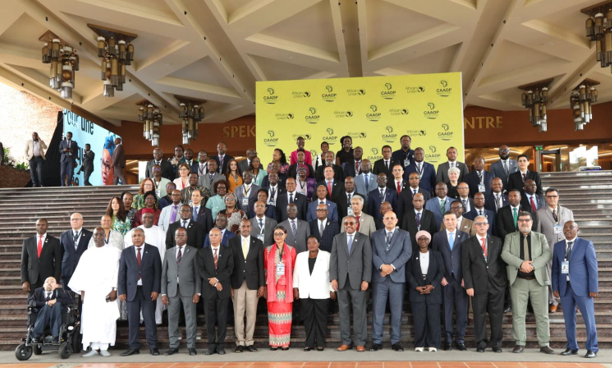
Our Correspondent | Africa Guardian
African Union Summit Falls Short on Concrete Agricultural Transformation Plans
The African Union (AU) summit held from January 9th to 11th, 2025, was seen as a crucial meeting aimed at raising agricultural productivity, boosting public investment, and stimulating economic growth through agriculture-led initiatives. The event’s broader goal was to find ways to help African nations tackle hunger and reduce rising poverty.
In recent years, however, African governments have focused more on increasing imports of basic agricultural products that could easily be grown domestically. Despite this, discussions at the summit failed to emphasize import substitution policies. Instead, significant portions of the meeting were spent approving large budgets for agricultural imports from foreign suppliers.
The AU has spent years developing an agricultural strategy aimed at achieving food security and poverty reduction across the continent. This initiative is a central part of the broader AU Agenda 2063. Initially launched in 2003 through the Maputo Declaration, and reaffirmed in 2014 through the Malabo Declaration, the strategy has become a cornerstone of Africa’s agricultural reform, aiming to bring about development entirely led and managed by African governments.
In early January 2025, the Kampala summit, attended by Agriculture Ministers from all 55 AU member states, discussed the implementation of the 10-year agricultural programme, slated to run from 2026 to 2035. The initiative aims to foster investment, strengthen partnerships, and empower smallholder farmers.
The drafting process of the programme, which took over a decade, was thorough and involved numerous stakeholders, including African experts, farmers’ organizations, development partners, and the private sector. Despite this extensive effort, Africa’s food security remains precarious. The continent faces challenges from climate change, conflicts, rapid population growth, and economic disruptions, leaving over 280 million people suffering from hunger.
The programme aims to address these issues through climate-resilient agriculture, improved infrastructure, reduced food waste, and better regional trade in agricultural products, aiming to make Africa more self-sufficient in food production. At the Kampala meeting, Ugandan Prime Minister Robinah Nabbanja stressed the shameful $100 billion spent annually on food imports. She called for concrete solutions to end Africa’s dependence on imported food, saying, “To secure our future as Africans, we must feed ourselves.”
Ambassador Josefa Sacko, AU Commissioner for Agriculture, emphasized that the new strategy would boost food production, add value to agricultural products, expand intra-Africa trade, and create jobs, especially for women and youth. She stressed the need for inclusive and resilient agrifood systems and improved governance through data-driven decision-making.
Ethiopian Agriculture Minister Dr. Girma Amente highlighted his country’s efforts to incorporate the Comprehensive Africa Agriculture Development Programme (CAADP) into its National Agricultural Investment Plan (NAIP), noting that Ethiopia had increased its agricultural budget and consistently met the CAADP’s growth targets. Similarly, Uganda’s Agriculture Minister Frank Tumwebaze emphasized the need for swift implementation of the strategy, focusing on technological innovation, climate-resilient agriculture, and agro-industrialization.
Despite the lofty ambitions of the summit and the strategic importance of the 10-year programme, much of the event was dominated by high-level speeches and little action. With African nations still heavily reliant on food imports and unwilling to disrupt the status quo, there was a sense of pessimism regarding any significant change. As the summit concluded, there was little hope for real transformation in Africa’s agricultural sector, leaving many to wonder if the continent would once again miss an opportunity to address its food security challenges and drive true agricultural reform.
___
